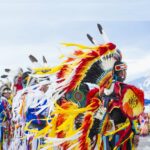National Native American Heritage Day is observed on November 24, a day after Thanksgiving. American Indians are accorded special honor on this day, and their rich cultures, accomplishments, contributions, and heritage are celebrated. The history of America begins with Native Americans, and the bald eagle on the U.S. shield is an Iroquois symbol. On this day, we can enjoy displays of their cultural fashion and unique recipes and speak out against the grave injustices they have experienced.
History of Native American Heritage Day
Dr. Arthur C. Parker of the Seneca nation first protested for National Native American Heritage Day between 1912 and 1915. At first, he was fighting for an “American Indian Day” to be recognized within the Boy Scouts of America. In 1990, President George H. W. Bush signed into law the legislation introduced by Congressman Joe Baca, to designate the day after Thanksgiving as American Indian Heritage Day. The law was established on November 28 as a day to pay respects to the Native Americans for their numerous contributions to the United States. The American Indian Heritage Day was supported by the National Indian Gaming Association (NIGA) and 184 federally recognized tribes.
The Native American Heritage Day encourages Americans of all backgrounds to appreciate the indigenous cultures appropriately, with ceremonies and activities. Schools are also encouraged to enhance their students’ awareness of Native Americans by providing classroom activities focused on their history, contributions, and achievements.
The United States House of Representatives initially passed the Native American Heritage Day Act of 2009, with technical adjustments made by a collective consent in the United States Senate. The House of Representatives unanimously voted to pass the legislation again, including the Senate’s adjustments. The legislation was then signed into public law by President Barack Obama on October 30, 2009.
Native American Heritage Day and Month is a huge platform for Indigenous people to educate society about their communities. On this day, more than ever, they lead the discourse on culture, celebrate their heritage by donning traditional footwear (“rocking the moccasin”), and shed some light on the diverse tribal communities.
Native American Heritage Day timeline
Archaeologists believe Native Americans might have crossed into America from Asia at about 12,000 B.C.
Dr. Arthur C. Parker of the Seneca nation begins his fight for the Boy Scouts of America to recognize an “American Indian Day.”
After Congress enacts the Indian Citizenship Act, Native Americans are finally granted citizenship in their indigenous country.
President Gerald R. Ford declares the first national, week-long observance for American Indians.
President George H. W. Bush signs a resolution establishing the national holiday.
President Barack Obama declares the month of November as National Native American Heritage Month.
Sharice Davids and Deb Haaland are the first Native American women elected to Congress.
The population of Indigenous People in the United States is 6.9 million, 2.09% of the country’s population.
Native American Heritage Day FAQs
What is the more appropriate term to use, American Indian or Native American?
Both terms are appropriate.
Do American Indians pay taxes?
Yes, they do. Both tribes and individual American Indians pay taxes.
How are tribes organized?
Tribes have innate rights to govern under their own systems of government. Tribal governments have various structures, and several of them have adopted constitutions, while others retain traditional methods of rulership. The governor of a tribe is commonly called the tribal chairperson, chief, governor, or president.
How to Observe Native American Heritage Day
Know the facts
Watch documentaries or read books that properly represent Native American history and culture. Take a tour of a Native American museum or heritage center near you.
Be socially active
Participate on social media or in online events observing Native American Heritage Day. TikTok’s #NativeFamily is a famous Native American Heritage community.
Cook like a true Native American
Choose a Native American meal to make. Try Three Sisters Soup, Pemmican, or simple Buffalo Stew. Native American meals are famously delightful, so try out some of their decadent recipes.
5 Facts About Native Americans
Their median age is 31
Native Americans consider the age of 31 as middle age.
Few Native Americans hold a professional degree
8% of Native Americans over 25 have a graduate or professional degree.
They own over 24,000 businesses
American Indians and Alaska Natives own about 24,503 businesses in the U.S.
There are hundreds of Indian tribes
As of 2020, the number of federally recognized Indian tribes equals 574.
The sequoia tree has a namesake
The giant redwood tree is named after the Cherokee leader Sequoyah, who helped develop the Cherokee alphabet.
Why Native American Heritage Day is Important
To accord rightful respect
It is a day to honor and recognize the indigenous people’s contributions to the United States. An official holiday enlightens people on how to do this right.
For appropriate involvement in their culture
We take part in the rich and diverse art, culture, and tradition of the Native people. This particular day allows us to bask in the beauty and uniqueness of their heritage, experiencing its multifaceted nature.
We learn and educate others
We learn and are inspired by how tribal citizens have synergized to conquer these challenges, and we hear these stories from the Natives themselves. It is the perfect chance to educate the public, to raise awareness about the unique challenges Native people have faced, past and present.
Native American Heritage Day dates
| Year | Date | Day |
|---|---|---|
| 2024 | November 29 | Friday |
| 2025 | November 28 | Friday |

















